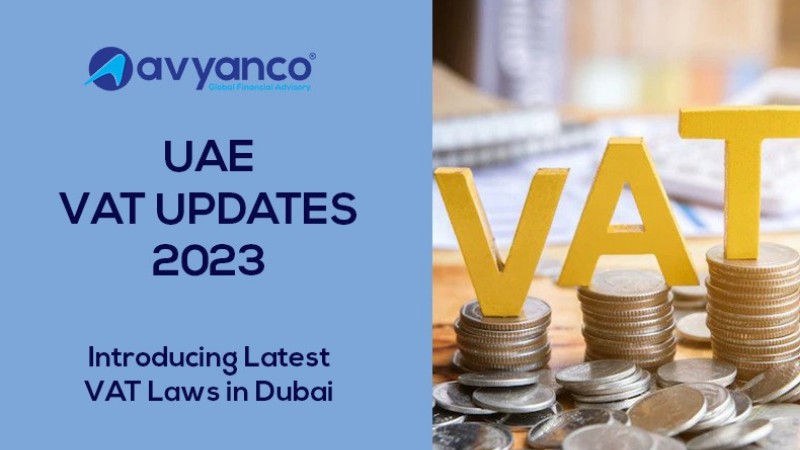2023 is expected to be a landmark for implementing new VAT laws in Dubai after the successful completion of 5-years tenure. VAT laws are a result of challenges and experiences faced by the business sector in Dubai. The new VAT in Dubai is aimed at providing the business sector with a streamlined framework. The new VAT rules and procedures are aimed to rationalize certain provisions and eliminate ambiguity in various interpretations. The UAE government aspires to take such initiatives in order to support the business sector by facilitating the VAT and taxation procedures.
VAT in UAE
Value Added Tax (VAT) also referred to as a type of general consumption tax is an indirect tax. Many countries and states around the world impose VAT typically on the supplies of goods and services that are sold and bought within a specific period. Value Added Tax (VAT) is one of the most common types of consumption tax found in developed countries.
The UAE government on January 2018 introduced VAT at the rate of 5% for businesses involved in providing goods and services. After the successful completion of its first 5-years tenure, the government is all set to implement UAE VAT amendments within the VAT system. Some crucial modifications have recently been made to VAT by the Ministry of Finance (MoF). The new and updated VAT law will be effective on January 2023 for businesses and investors.
VAT Registration in UAE
Business registration is a must under UAE VAT Laws. The registration of business entities for VAT depends on certain income levels generated by the company. In order to apply for VAT registration and obtain a Tax Registration Number, you will have to fill out the VAT registration form available online. Investors will have to provide essential documents required as well.
Documents Required for VAT Registration
You will have to submit the below-mentioned documents for VAT registration in Dubai:
- Company trade license
- Bank details including IBAN
- Memorandum of Association
- Turnover report with supporting invoices
- Company stamp and contact details of the company
- National ID of the owner or passport and Emirates ID
You may talk to a financial and accounting expert like Avyanco for further assistance on how to apply for the VAT in Dubai. Avyanco is a leading business setup and tax consultant who aspires to assist you in every step of the VAT registration process.
Why Did UAE Introduce VAT in 2018?
The UAE government introduced VAT in 2018 in the country to generate revenues without burdening businesses. With a tax based on consumption, VAT provides a good amount of revenue as a consistent tax. Businesses must provide 5% VAT to the country based on a certain level of purchase and sales of goods and services.
The primary aim of introducing VAT is not only to generate revenues but providing the business sector with a robust tax framework where they can seamlessly comply with the rules. A few of the other ultimate benefits of VAT include an increase in tax revenues, ease of administration, decrease in variation, discouragement of tax evasion, and more.
Businesses shall comply with VAT returns during a period provided by the government. You must submit your VAT returns and related VAT payments within 28 days of the end of your tax period after registering for VAT in UAE.
VAT Audit in UAE
VAT is a self-assessment tax audit in which the taxpayer determines the amount of tax due and recoverable based on the supplies made during the reporting period. The taxpayer will have to submit accurate information to the FTA. The FTA will conduct a VAT audit in UAE to determine whether or not the self-assessed declaration is accurate.
The FTA will send a notification in the form of an assessment asking the taxpayer to pay the VAT along with penalties if it is discovered during the audit that there are certain irregularities leading to underpayment of the VAT or over-claiming of the input VAT deduction.
Therefore, it is a must to exercise the best industry practices when conducting a VAT audit. Especially after VAT updates in Dubai which will come into effect from 2023. You may have to consult with an accounting & tax expert like Avyanco who can help you streamline your books of accounts.
New UAE VAT Amendments in 2023
With the latest changes in VAT in UAE, the business sector in Dubai will see many changes. The Ministry of Finance recently announced changes to certain provisions of the VAT whilst modifying some crucial provisions in regard to the Value Added Tax (VAT). The new VAT amendments will be implemented from January 1, 2023, across the country.
The key modifications and indicators in the latest Dubai Tax Law include:
- The Executive Regulations may specify any additional supply (other than those listed in Article 7) according to a newly introduced provision in Article 7. The transfer of a firm that are expressly regarded as falling beyond the purview of VAT.
- Both registered and non-registered individuals will be covered by Article 15’s exception to registration requirements.
- One of the events used under Article 26(1) to determine the date of supply in special circumstances is the date where one year has been passed since the date the goods or services were given.
- In accordance with the new interpretation of Article 30(8), the place of delivery of services related to transportation shall be the location at which the transportation commences.
- With regards to place of residence of a principial, According to Article 33, an agent’s residence is considered to be the principal’s domicile. The place of residence of the agent must be the same as the principal’s, according to the existing VAT Law.
- Now, Article 37 (value of deemed supply) will take precedence over Article 36, which deals with the specific anti-avoidance provision for the value of supply or import of goods and services between related parties.
- Clauses 4, 5, and 6 of Article 45 specify other commodities that are subject to Zero-Rated for paying VAT. This covers the import of vehicles, the import of accessories for vehicles, and the import of rescue ships and planes.
- In accordance with Clause 3 of Article 48, Pure Hydrocarbons—defined in the new Decree-Law as “any kind of various pure combinations of a chemical equation made only of hydrogen and carbon”—will be subject to the domestic reverse charge.
- The conditions for the taxable person to recover VAT paid or declared on the import of goods or services are outlined in two additional clauses that have been added to Article 55 regarding the recovery of input VAT.
- The ability of government organizations to recoup input VAT paid for the performance of sovereign activities is now specifically mentioned in Article 57. Similar to this, nonprofit organizations may claim input VAT paid for the delivery of qualifying charitable activities.
- Due to incorrect charge of tax treatment used by the taxable person is now covered by the output VAT adjustment outlined in Article 61(1). The taxable person should now issue a tax credit note to adjust the output tax in such circumstances.
- The requirement that the taxable person provide a tax credit note within 14 days of the date on which any of the instances specified in Article 61(1) happens is now a part of Article 62(2), which deals with the process for output VAT adjustment.
- If a taxable person sends a tax invoice with the word “VAT” on it or gets money in the form of VAT, they are required by Article 65(4) to pay the VAT to the Federal Tax Authority (FTA).
- According to Article 67(1), the tax invoice’s issue date under Article 26 (the date of continuous supply) is 14 days after the date of the supply.
The latest VAT changes in Dubai are aligned with the best tax standards that are globally recognized. The UAE government made these amendments based on various challenges experienced in the business sector throughout the years. The primary aim is to fill any tax system gaps, streamline a robust VAT mechanism, and provide investors with an environment where they can run businesses profitably. The updated VAT in UAE is promising for companies despite their size, type, nature, or the industry in which they operate.
How Avyanco Can Help Businesses with VAT in Dubai?
Avyanco is a trusted and the best business setup consultancy in Dubai working actively to assist businesses in countless ways. We have qualified business advisors, accountants, financial experts, and tax consultants who will assist you with each aspect of your business.
We make sure to deliver high-quality professional services to remain #1 in the industry. Our team keeps a close eye on each latest happening especially when it comes to tax and VAT in Dubai. We are dedicated to providing you with accurate, true, and up-to-date information to help you revise your business financial policies and comply with the regulations efficiently.
From setting up a business to applying for VAT registration to conducting a VAT compliance audit, we can help!
Contact us today!



